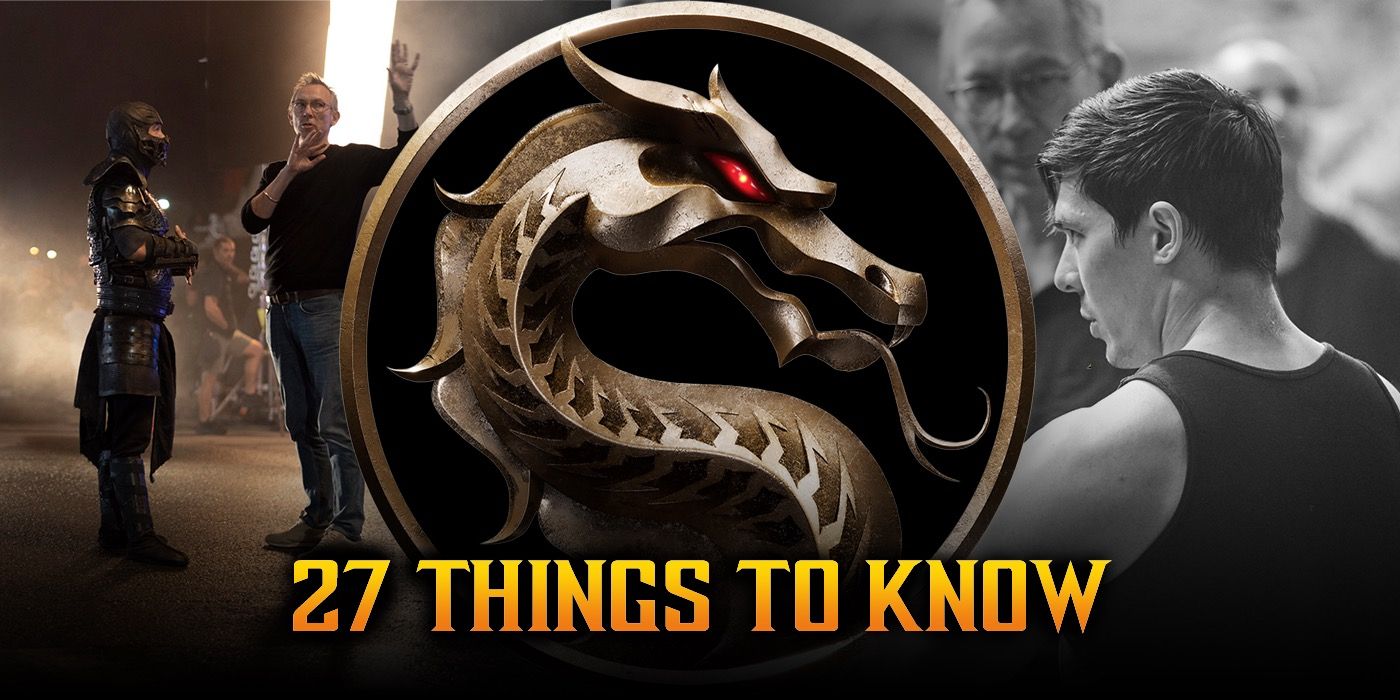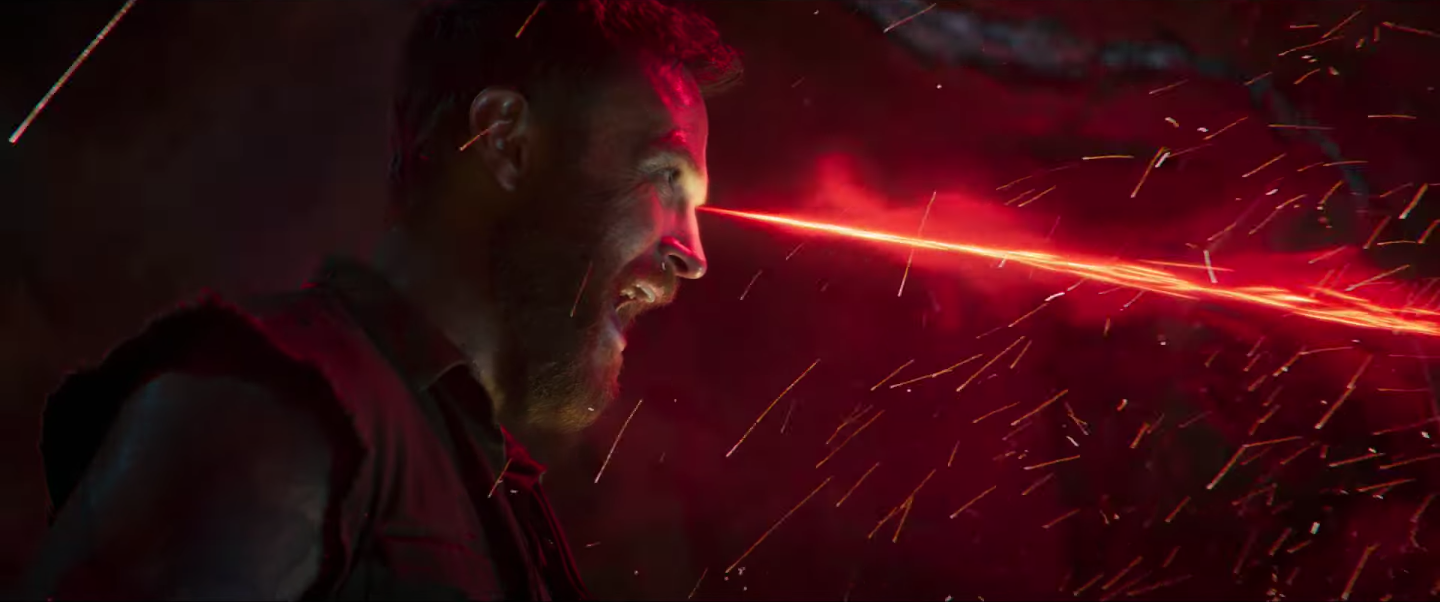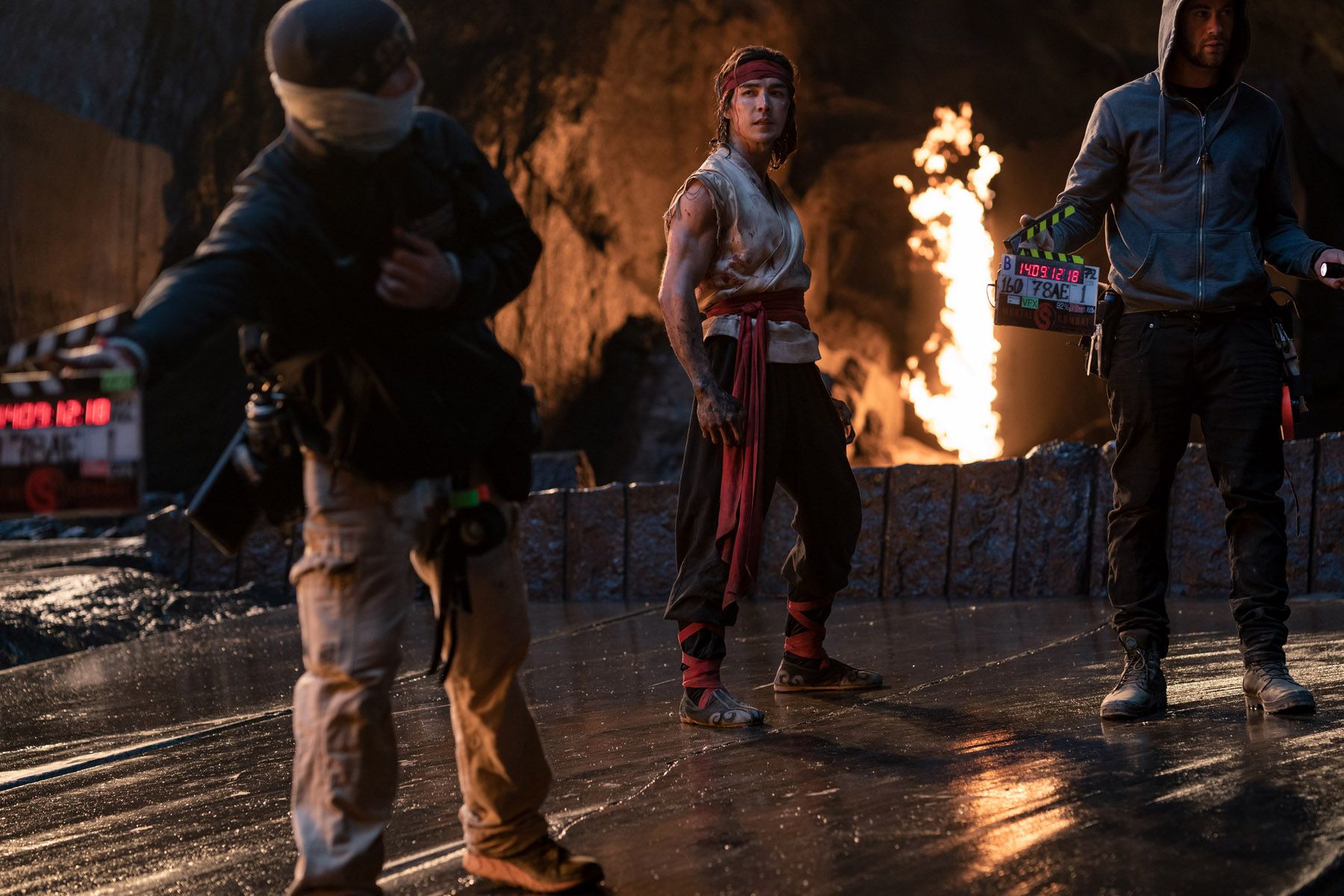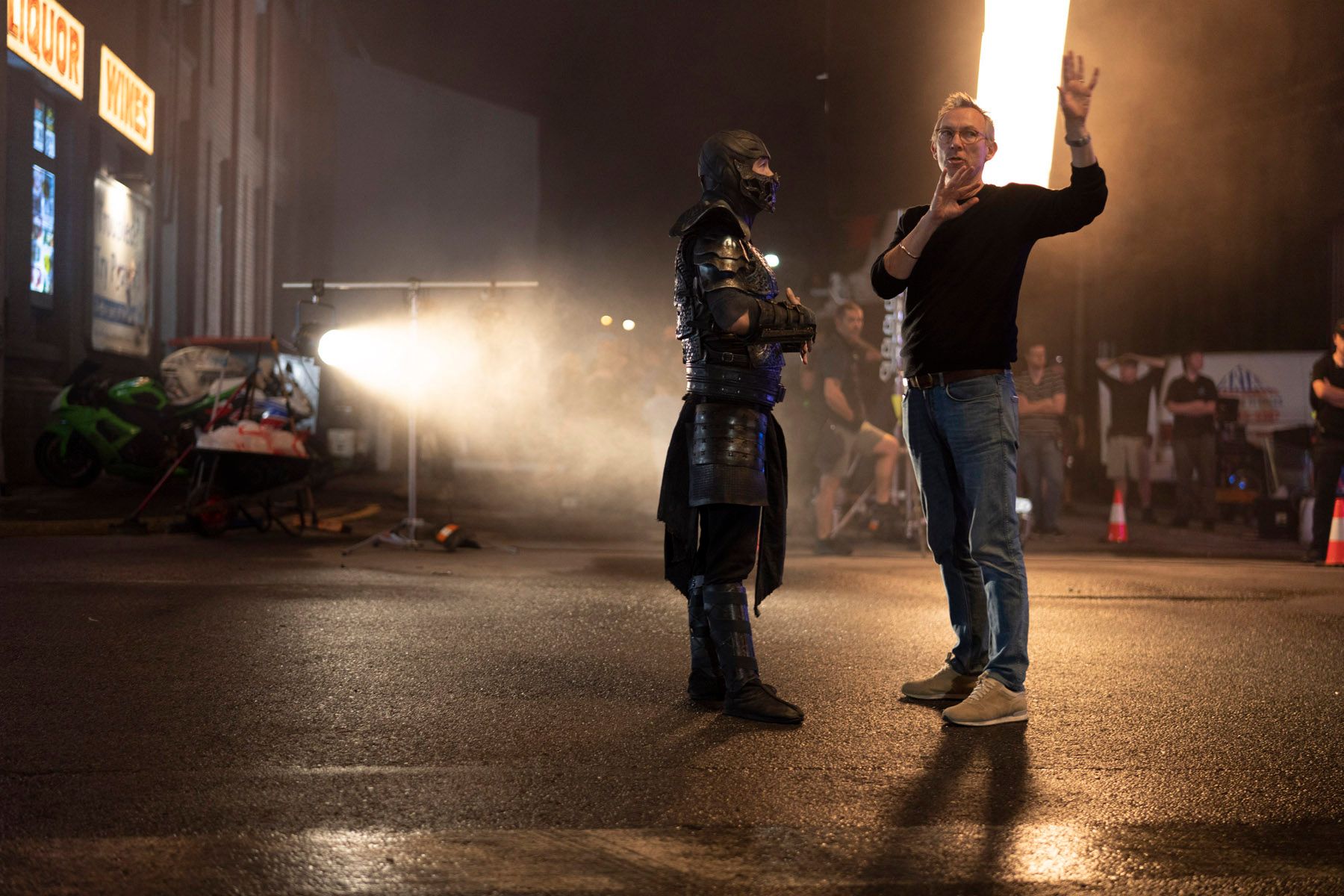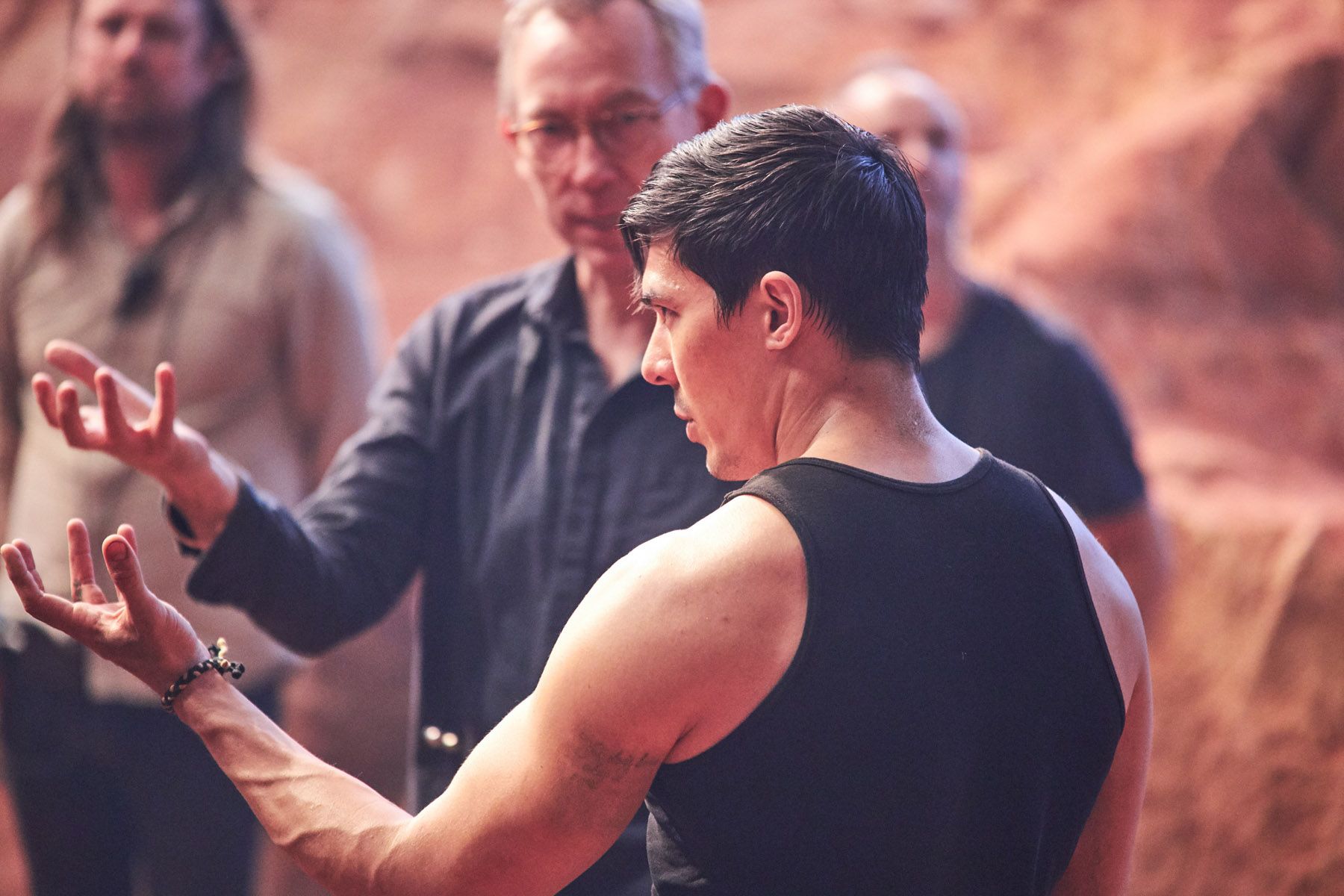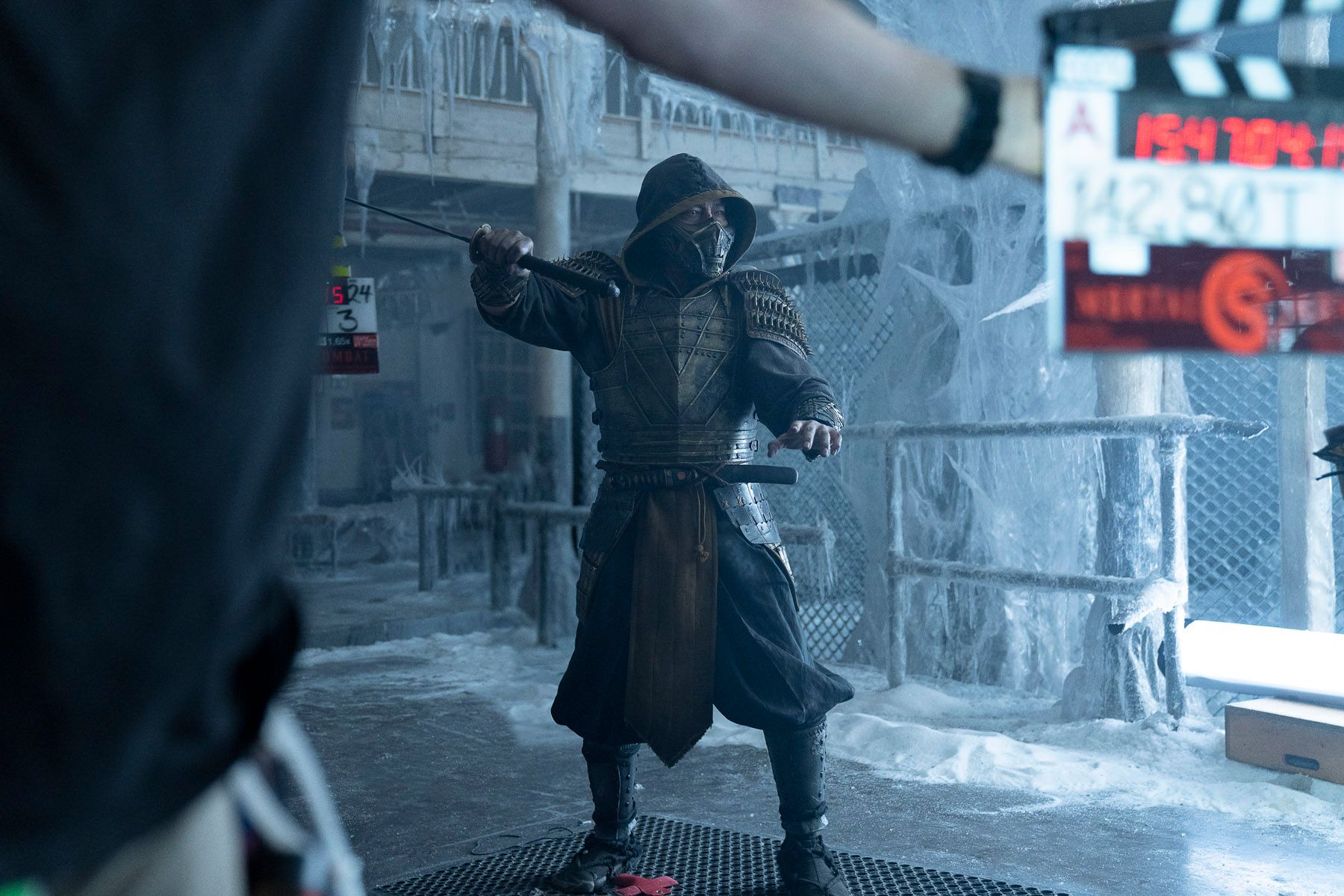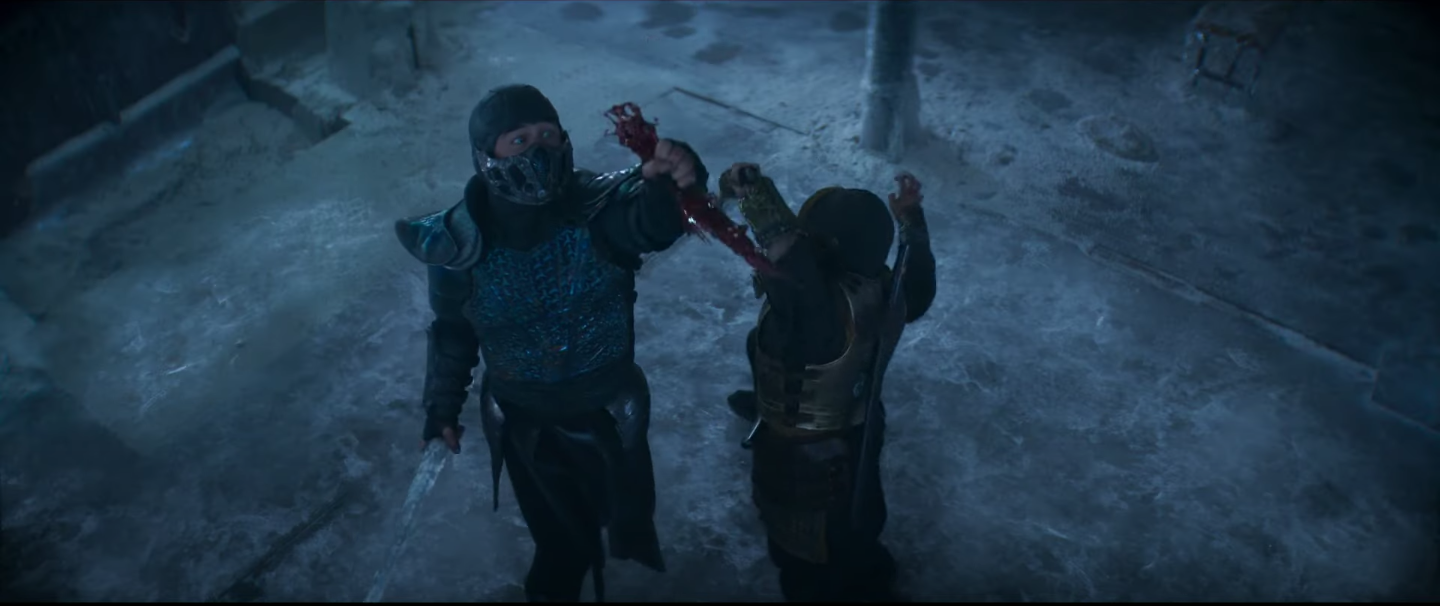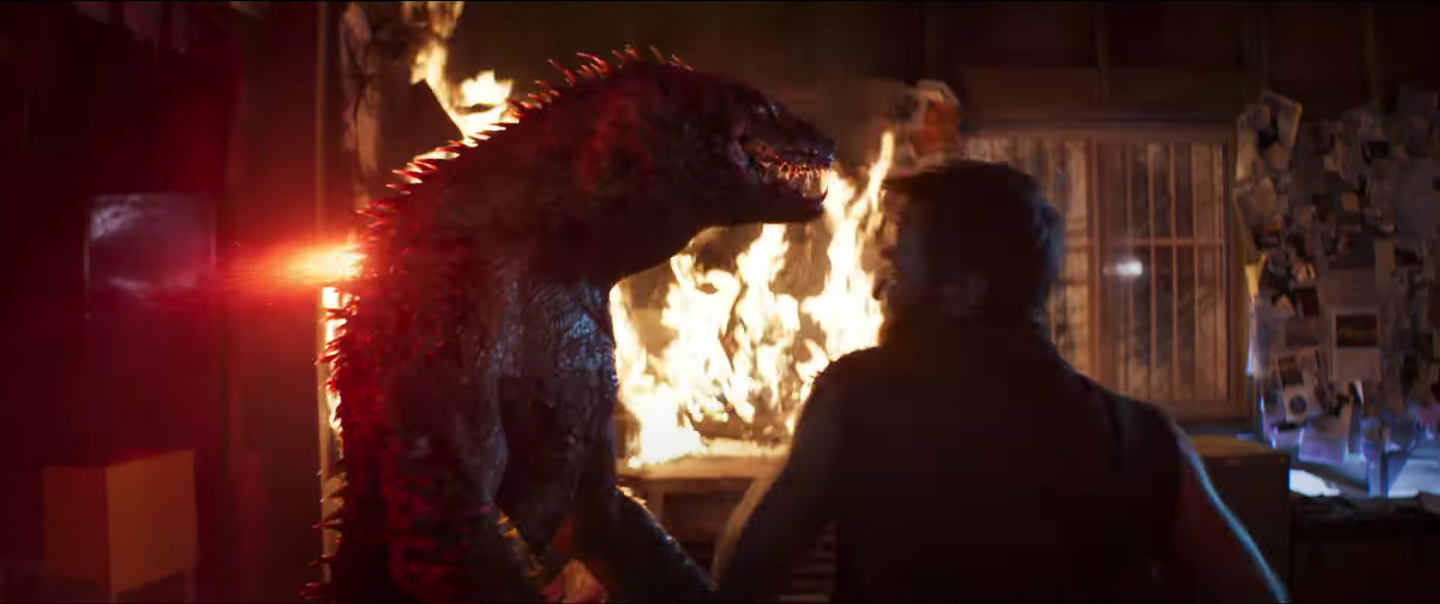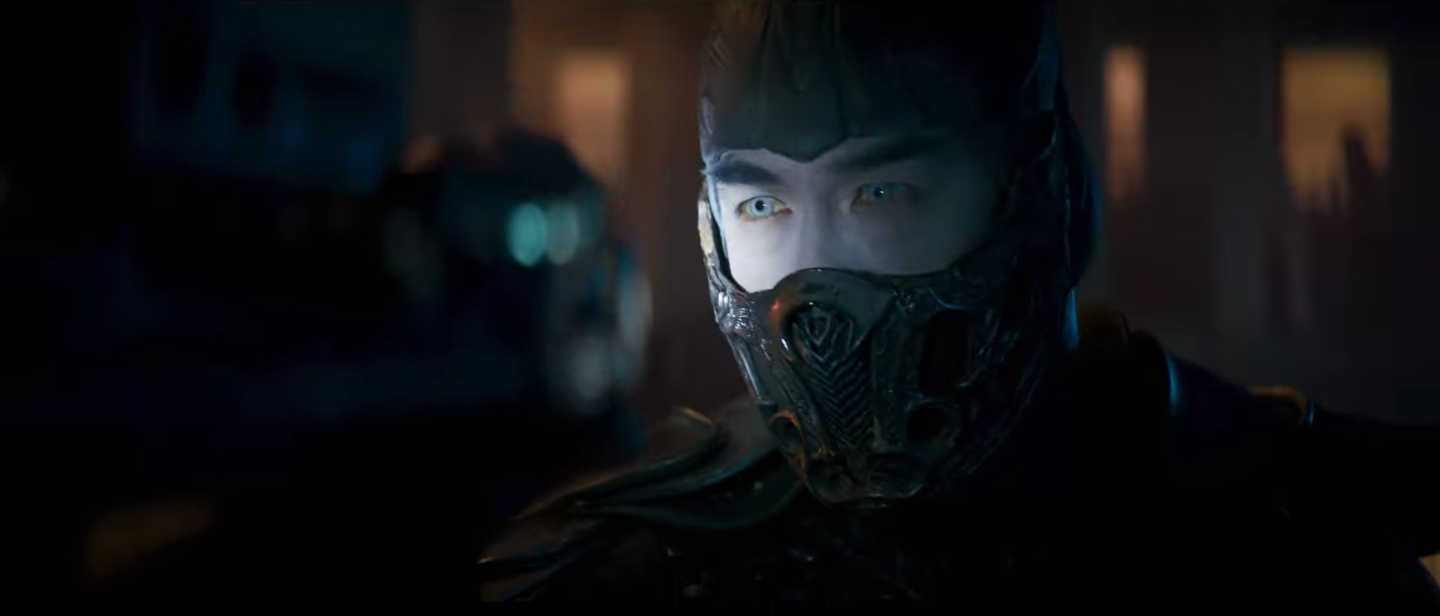Grab your Lin Kuei mask, sharpen your fan, and find an acid-protecting shield: Mortal Kombat, the brand new movie adaptation of the long-running video game franchise, is coming to theaters and HBO Max soon. You may have seen the most recent trailer, and you may have scrutinized it frame-by-frame for clues like we did, but if you want the most up-to-date information, you gotta head to the source.
Collider visited the Australia-based set of Mortal Kombat during principal photography back in 2019, and was able to sit in on interviews with key members of the cast and crew, including: Director Simon McQuoid, producer Todd Garner, and actors Tadanobu Asano (Raiden), Max Huang (Kung Lao), Josh Lawson (Kano), Ludi Lin (Liu Kang), Lewis Tan (Cole Young), and Joe Taslim (Sub-Zero). During their informative chats, we gleaned 27 new things we now know about the Mortal Kombat movie. Ready to start the tower?
It’s More Than Just a "Tournament Movie”
You're definitely gonna see a bunch of folks fight each other in a martial arts tournament. But Mortal Kombat has more on its mind, heart, and soul than just punches and kicks. As Lin described it, they needed to justify the reason to make this a movie and not just another fighting game (and as for the fighting, Lin spoke of the film's thesis that fighting and struggling "has to have meaning... we struggle and we keep struggling because it's meaningful to us"). Taslim called the "human story" deep and soulful, emphasizing the character arcs present in the screenplay by Greg Russo, Dave Callaham (Shang-Chi and the Legend of the Ten Rings), and Oren Uziel (Mortal Kombat: Legacy).
The Cast Is Representative, Accurate, and Inclusive
Lin told a story of another film he worked on where he was the only Asian performer. To try and boost that film's level of representation and visibly, he actually asked the director to cast some Asian background extras in group scenes (this request was denied). If 60% of the world is Asian, wondered Lin, why do casting directors treat this group like Highlander — there can be only one?
This was not the case on the set of Mortal Kombat. From the jump, Garner wanted to appropriately cast the characters based on their race and country of origin from the games, avoiding the pitfalls of casting a white Sub-Zero or Raiden as they did in the 1995 Mortal Kombat film adaptation. Lin explained that "all films are global," and in the world, "there aren't token Asians." A globally-reaching film should represent every member of the world; as Taslim put it, movies are "a great way to bridge" the gap between diversity of a population and diversity in our mass culture.
And when the cast arrived to set, this feeling of inclusion was inherent into the way everyone worked. McQuoid took care in representing the characters as accurately as possible, down to ensuring the correct dialect that Kung Lao would use, given his character's background. Lin described McQuoid as being uncommonly sensitive and interested in learning about other cultures, and explained that that feeling of sensitivity moved throughout the set: "Everyone feels it, and it feels right."
The Villains Are Complicated
Taslim is playing Sub-Zero, who is, indeed, a villain. But don't expect his portrayal of the freeze-inducing warrior to involve mustache-twirling, maniacal cackling, or any other stereotypical "villain" trappings. Taslim is playing Sub-Zero with "a layer of consciousness," a self-awareness toward his status as a vicious Lin Kuei assassin, an active wondering if this is the life he chose or rather the life that chose him? Taslim also spoke about the small part of every villain's psyche that's "considering good" and how rewarding and challenging that balance was to play.
As for Kano, that rough-and-tumble Aussie assassin with a red eye prosthetic and penchant for eating hearts, Lawson did make sure his portrayal "pushed boundaries" and gave the fans the kind of rabble-rousing chaos they expect. But he also spoke about the psychology of Kano in elevated terms, describing the inherent appeal of a character like him as being given "permission to say and do things we can't in civil society." Lawson described the character as "self-serving, greedy, opportunistic," all traits that we shouldn't be in real life, but are engaging and intriguing to engage with psychologically on the screen (Lawson also mentioned he's finding himself behaving blunter in real life as a result of playing Kano; uh-oh!).
We Might See a Different (But Familiar) Version of Sub-Zero
Joe Taslim did not out and out say his depiction of Bi-Han, aka Sub-Zero, would eventually turn into dark and shadowy ninja Noob Saibot, as he does in the Mortal Kombat video game mythology. But we definitely see some kind of shadowy ninja in the trailer. And Taslim definitely walked right up to the edge of saying this will happen to him, too.
"It's not a secret that Quan Chi took the humanity inside of Bi-Han and turned him into Noob Saibot," explained Taslim, reminding everyone this was all information available in a Google search. He went on to explain that this inner conflict between "humanity" and "pitch black" is a key part of the character he plays in the film Mortal Kombat... and then ends with a cheeky "so that's it" before he out-and-out says he's Noob Saibot. Maybe we're reading too much into tone and legalese, but I wouldn't be surprised if we see Sub-Zero turn into Noob Saibot in the film.
It’s Going to Have "The Best Fight Scenes That Have Ever Been on Film"
When McQuoid spoke to his stunt coordinators, Kyle Gardiner and Jade Amantea (Aquaman), for the first time, he said simply this: "We have to make the best fight scenes that have ever been on film. No pressure."
This is, obviously, a lot of pressure, and a wild benchmark to try and hit. But the entirety of the cast and crew were up for the challenge and thensome. Garner revealed that not only will the signature moves from the video games be visible in the film, but teased that there's not a single piece of general martial arts choreography left unused in the film. And "martial arts" is the key word here, not "action." The cast and crew made sure to differentiate between the two, calling Mortal Kombat a martial arts film stacked with real martial artists (Garner also referred to the film, and its peerless pool of martial arts talent, as a "dance film" in which dancers flow and move at their absolute best).
Huang said that a film audience is not stupid; that if the film used tricks like over-editing fights or switching in stunt doubles, they would notice and be pulled out. So, McQuoid and his team made sure to shoot these sequences in flowing, long, wide takes where you can just see the fighters fight (in fact, Tan brought previous fight sequences from his other films to show McQuoid how good he can be, and how he even wants to best that). McQuoid also made sure each fight had a demonstrably different style to avoid what he called "fight fatigue," allowing his actors to pitch spontaneous pieces of choreography to keep everything interesting (Huang, in particular, brought lots of his own take on Kung Lao to the proceedings).
The fights won't just be about physical mayhem, however. As Lin described it, cinematically, fight scenes are the most honest piece of drama you can communicate. There's no lines to hide behind; just the raw, guttural, emotional reaction you have to being punched in the head. You can't lie about that. So, these fight scenes are about truth — not just in the fidelity of physical action, but about the emotional back-and-forth the participants are going through.
Sub-Zero and Scorpion Love Each Other (When They’re Not Fighting)
Depending on whether you're playing against a friend or through a recent story mode, Mortal Kombat the game tends to either pit Sub-Zero and Scorpion directly against each other, or puts them in a tenuous alliance that could fall apart the more each character gives into their supernatural powers and temptations into evil.
In Mortal Kombat the film, you'll definitely see Sub-Zero and Scorpion fight with each other. But when the cameras aren't rolling... it's nothing but love, baby! Martial arts actor and legend Hiroyuki Sanada (seen in a startling cameo in Avengers: Endgame) plays the hand-spear chucking Lin Kuei ninja Hanzo Hasashi, aka Scorpion. And while Sub-Zero actor Taslim promises some clutch fighting between the two, he also revealed his sincere reverence for Sanada. He's been watching Sanada since The Last Samurai, "idolized" him as a child, and is beyond respectful and grateful the two get to work together, bond together, and yes, fight together. Taslim also revealed that even though Sanada is now 60 years old, he still "moves like a real ninja," with Garner also in awe of Sanada's choreography abilities and pitches.
Raiden Won’t Be the Typical God of Thunder
Raiden, the Earth Realm-protecting god of thunder and mentor to our heroes, may be "stronger than Hogun," Asano's character in Thor: Ragnarok. But that doesn't mean he is a typically stoic fount of wisdom as he's often depicted in other Mortal Kombats. Asano found a sense of "childishness" in his performance as Raiden, describing that he is "peaceful," but also fundamentally "hurt.". Asano also described how he first felt that Raiden was a very "still" character, but then after filming one pivotal scene, realized he is full of churning emotional complexities, and even "love" for the Earth dwellers he fights for.
There’s Comedy, but Not Cheesiness
You can find lots of people to defend the overall tone of the 1995 Mortal Kombat film (I will be first among them). But if you want your new Mortal Kombat film to feel a little more reigned in, worry not. Garner explicitly said you won't see the "wink-wink cheesiness" prevalent in the '95 take on the material (though leaves the door open for future films engaging with that tone).
But that's not to say there isn't levity, or even out-and-out comedy. Lawson's Kano, in particular, is a blunt force of comic relief, even functioning as a classic voice of reason (despite the wildness of what he says; Garner equated his performance to a "dog off the chain"). Lawson worked with McQuoid to deliver a Kano that's less reverent to the arcana and mythologies of Mortal Kombat, representing a kind of audience member who looks at all of this stuff and says, "This feels kinda silly!" But, for Kano's jokes and call-outs to work, it just means the rest of the film needs to take itself even more seriously. Lawson described his comedic language as being part of a see-saw — when a mystical character is treated seriously, he can treat them funnily, and therein lies the comedy.
The Director Leads a Collaborative Family
Despite the film's structure around "people beating each other up," there was not a sense of competition, of one-upmanship between the cast. Instead, McQuoid, whom Tan calls one of the calmest directors he's ever worked with, fostered a sense of collaboration, community, inspiration, and even family on set (Taslim, when watching another actor do lots of flips, remarked with glee that he can't do that, unaware that every other actor did nothing but praise him for his speed). Lawson said that McQuoid took care of his actors, that it was obvious he cared about finding the correct "alchemy" for each performer to find their best work with each other. And while the script and choreography obviously requires a sense of tightness to work, McQuoid encouraged improvisation on both parts. Lawson riffed like no tomorrow as Kano (understanding he wasn't sure what would make it in), and Huang, among the other martial artists, would pitch moves like a standing 540 degree spin to enthusiasm. McQuoid summarized these happy, familial feelings as being nothing but helpful to the overall final product, saying he believes a sense of human connection permeates throughout the film as a result.
Cole Young Is Our Entry Into the Story
Who the heck is Cole Young, our main character completely new to the mythology of Mortal Kombat? Tan recounted in glee how the fans would glom onto every piece of detail seen about him to insist he was actually playing a pre-existing character ("I like wearing Ray Bans, I must be Johnny Cage!"), but in actuality, Cole Young was designed from the beginning as "a grounded entry point into the story." An MMA fighter coached by his daughter (a relationship paralleled by Tan's relationship with his father, fight coordinator Philip Tan), Cole is down on his luck, feeling like he missed his one opportunity, and in desperate need of a win. By positioning him as an underdog, the Mortal Kombat filmmakers want to make him instantly endearing, relatable, and root-for-able. He also functions as both a nice device to introduce viewers unfamiliar to the world of Mortal Kombat, and as a way to give longtime fans something new (and even make the already existing backstories of familiar characters pop even harder and even more unfettered, as Garner explained).
Or, as Tan jokingly stated, he might be playing Goro all along.
Real Fighters Influenced Tan and Cole
To play an MMA fighter, Tan needed to engage with MMA. He was already a fan of the fighting scene, calling to attention its intriguing history and evolution in fighting styles, and especially looked at welterweight UFC fighter Jorge Masvidal for inspiration as to how Cole moves. But Tan didn't just look to other fighters for inspiration; he, himself, is a professional kickboxer and muay thai fighter, and he used his experiences in the ring (especially his experiences losing) in key components of playing Cole.
Your Favorite Characters Get Impressive, Accessible Introductions
McQuoid admits he has "a lot of plates to spin" in crafting this film. Not only does he have to cater to fans eager for an accurate, thrilling depiction of their favorite characters, but he has to introduce them organically to folks who have never heard of Mortal Kombat in their dang lives. To achieve this dance, McQuoid and his screenwriters worked hard at blowing out the existing storylines, canons, and powers of the existing characters into "universal themes" and storylines.
And to introduce some of these universal themes, McQuoid teased, cryptically but alluringly, a special prologue sequence of the entire film that will give people a grand, understandable, and epic introduction to many key Mortal Kombat characters and ideas. Ooh, what could it be?!
The Composer’s Been Working Since Before the Film Was Shot
When McQuoid first met with composer Benjamin Wallfisch (The Invisible Man, one of our favorite 2020 scores), he thought they were having a preliminary "are you interested?" kind of meeting. Quoid was convinced he would have to "hard sell" Wallfisch on getting involved in any kind of capacity. But as it turns out, Wallfisch had already composed a demo track for the Mortal Kombat film score — well, well before any cameras had started rolling — a piece of preemptive work so thrilling it made McQuoid fall out of his chair. And when he got back up and listened to the track, it provoked literal "sweat on my forehead," it was so exciting to McQuoid. Wallfisch was immediately hired, and McQuoid used this demo track as a piece of sizzle to hire on potential castmates (Tan, in particular, revealed that the vision for the film "clicked" as soon as he heard this score).
And worry not, MK music fans... Wallfisch's work will incorporate that classic Immortals' rhythm.
The Film Is Epic in Scope
In discussing the visual look and breadth of the film, comparisons like Star Wars and the Avengers routinely came up. But unlike many of these modern blockbusters' usage of blue screens and CGI, Mortal Kombat was largely shot on location in Adelaide, a city in which you can drive from a location that "looks like Mars" to a more traditional forest in one day — not to mention the film's wild, practical sets built. McQuoid strove for making the sci-fi/fantasy-leaning elements of Mortal Kombat as believable as possible by shooting as tactiley, as reality-based as possible (however, Goro will be a fully CGI-character, as Garner believes you can tell based on the '95 film that a fully puppet version of the character would not work).
To get to a bigger-budgeted, more epic scope for the picture, one that could attract talent like James Wan (Aquaman) to attach as producer, Garner made the difficult decision to move away from the vision of Kevin Tancharoen, who turned heads with his series of ultra-violent, ultra-grim, ultra-low-budget Mortal Kombat fan shorts that eventually turned into the TV series Mortal Kombat: Legacy. As Garner described Tancharoen's work, it was contained, dark, and explicitly for fans, whereas Garner wanted the film to feel open, brighter, and for everyone. So he met with Wan and screenwriter Russo and asked them, if money was no object, where would they go? Immediately, the comparison to the MCU was derived, and the team set to make a film that feels as big as those blockbusters, while also finding inspiration in the MCU's character dynamics (i.e. Iron Man is a grounded character who meets increasingly mystical characters, just as our grounded character Cole Young does in Mortal Kombat).
Don’t Worry — There Will Be Blood
The Mortal Kombat film is rated R, and will have lots and lots of blood. McQuoid said he's seen "drums of blood" sitting around on set, and the actors all tended to agree they needed to channel as much violence as possible while performing their roles. However, the blood won't be used in either an overly performative, extreme way (the MPAA has a lot more stringent rules than the ESRB, explained Garner) nor a campy, funny-on-purpose way. Rather, McQuoid's goal is to make the blood hit you brutally, to serve as an emotional punch in the gut, to provoke a visceral reaction of shock and horror out of the audience. To all this I say: Yes.
Liu Kang and Kung Lao Are Cousins...
In every iteration of the video game thus far, Shaolin monks Liu Kang and Kung Lao are close friends, allies, and warriors in the fight against evil forces. In this new Mortal Kombat film, that relationship is heightened to a familial state: The characters will be canonically cousins! Although, as Lin says, the closest Chinese word that exists for the relationship between Liu Kang and Kung Lao (Huang) isn't "cousins." It's actually closer to... "brothers." Didn't expect the Mortal Kombat movie to warm your heart, didja?
... and Kung Lao Originally Auditioned for Liu Kang!
When Huang was originally brought in to audition for Mortal Kombat, it wasn't as Kung Lao, the role he's playing. It was for Kung Lao's cousin, Liu Kang! When the producers called to offer him the part of something he didn't even audition for, Huang was confused at first. But pretty soon, he learned to commit hard.
The Actors Took Inhabiting These Characters Seriously
This is the first time we're seeing Kung Lao in a live-action movie, a fact that Huang takes seriously. So when he began researching his role, he straight up made himself a cardboard hat to match Kung Lao's signature brim, and began practicing on his own with it (as he states, the hat makes that character). When it came time to get fit for Kung Lao's actual on-screen hat (a process he flew out to New Zealand to undergo), he was surprised by how heavy it wound up being, and had to change his tactics and style as a result.
Huang's not the only one who took it upon himself to "become" the character. Taslim was the very first actor cast in this Mortal Kombat film, and he sat around, technically having won the role of Sub-Zero, for nine years of development hell! During this time, he never wavered in his commitment, doing tons of research in all things Sub-Zero, even cramming in bursts of mythology on set in between setups and takes.
Our Kung Lao Cut His Teeth With a Martial Arts Legend
Max Huang spent his life training and working with the stunt team of a martial arts actor you may have heard of, Jackie Chan. In working with this absolute legend, Huang felt as though he went to film school all over again; Chan and his crew were experts at staging, choreographing, cutting, and crafting the overall piece of a sequence to make the best martial arts cinema possible. Using these skills, Huang was able to confidently pitch ideas to make Mortal Kombat's choreography even better — and even used this background to help him retrain himself into Kung Lao's martial arts style instead of his own.
One Actor Is the Best at 'Mortal Kombat' (The Game)
As you might expect, the actors spent a lot of off time playing the video game Mortal Kombat. Lin held firm to the promise that he would only play as Liu Kang during the duration of the shoot. But only one actor was unilaterally deigned the best at the game: Joe Taslim. In fact, Joe Taslim himself would be the first to say he's the best at the game, shouting, simply, "I'm the best!" And wouldn't you know it, his main's Sub-Zero.

